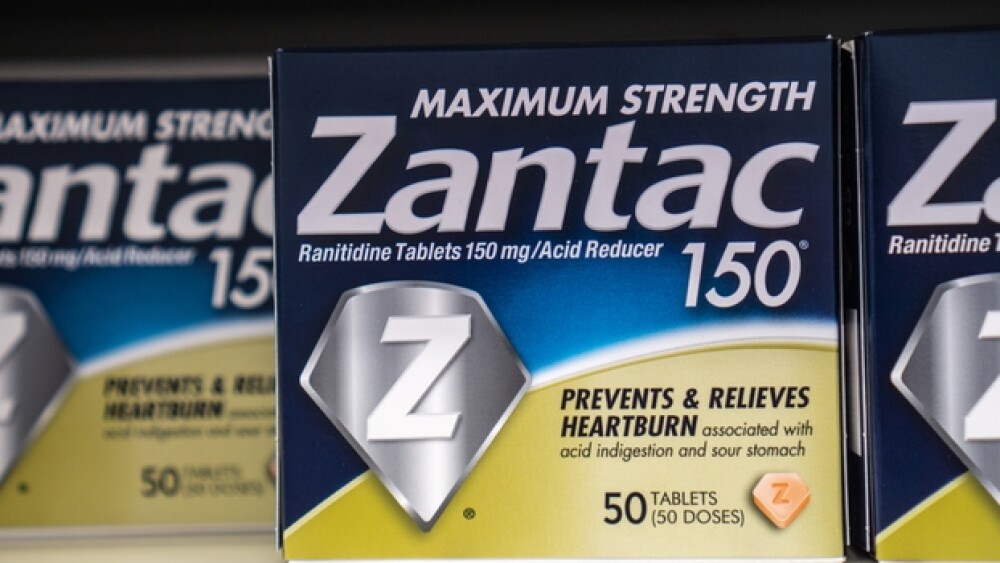Following months of concerns regarding the potential contamination of ranitidine-based products with known carcinogens, the U.S. Food and Drug Administration is asking manufacturers to immediately withdraw all prescription and over-the-counter drugs from the market.
Following months of concerns regarding the potential contamination of ranitidine-based products with known carcinogens, the U.S. Food and Drug Administration (FDA) is asking manufacturers to immediately withdraw all prescription and over-the-counter drugs from the market.
The FDA said this drastic measure is the latest step in the ongoing investigation into the potential contamination of the ranitidine products, such as the blockbuster medication Zantac, from the known carcinogen N-nitrosodimethylamine (NDMA). The agency has determined that the impurity in some ranitidine products increases over time and when stored at higher than room temperatures and may result in consumer exposure to unacceptable levels of this impurity, the FDA announced this morning. As a result of the market withdrawal request, ranitidine products will not be available for new or existing prescriptions or OTC use in the U.S., the FDA said.
Sanofi, the maker of Zantac, and other companies that manufactured ranitidine products, such as Glenmark and GlaxoSmithKline, had removed some lots from the shelves when the issue was first reported in the fall of 2019.
Janet Woodcock, director of the FDA’s Center for Drug Evaluation and Research, said the regulatory agency is making the withdrawal step out of an abundance of caution. She noted that during the course of the FDA’s investigation into ranitidine-based products, the agency did not find unacceptable levels of NDMA in many of the samples. However, she said since the FDA does not know how or for how long the product could have been stored and how that impacted its quality, it was necessary to call for the removal of the products from the shelves.
NDMA is a known environmental contaminant and found in water and foods, including meats, dairy products, and vegetables. In large amounted NDMA can cause health problems, but the FDA said the levels it initially found in ranitidine were low, however, those levels have been considered unacceptable for the product, which at one time was the best-selling medication in the world. Recent FDA testing and evaluation prompted by information from third-party laboratories confirmed that NDMA levels increase in ranitidine even under normal storage conditions. The testing also showed that the older a ranitidine product is, or the longer the length of time since it was manufactured, the greater the level of NDMA. These conditions may raise the level of NDMA in the ranitidine product above the acceptable daily intake limit, the FDA said.
“The FDA is committed to ensuring that the medicines Americans take are safe and effective. We make every effort to investigate potential health risks and provide our recommendations to the public based on the best available science,” she said in a statement. “The FDA will continue our efforts to ensure impurities in other drugs do not exceed acceptable limits so that patients can continue taking medicines without concern.”
Ranitidine is an H2 (histamine-2) blocker, which decreases the amount of acid created by the stomach. Following its withdrawal announcement, the FDA said it will send letters to all ranitidine manufacturers urging the removal of the products from the market. In addition to asking manufacturers to remove the products from the shelves, the FDA is also advising consumers who are taking ranitidine to stop and dispose of the products. Patients taking prescription ranitidine should speak with their health care professional about other treatment options before stopping the medicine, as there are multiple drugs approved for the same or similar uses as ranitidine that do not carry the same risks from NDMA, the FDA said. The FDA has not found NDMA in products such as Pepcid (famotidine), Tagamet (cimetidine), Nexium (esomeprazole), Prevacid (lansoprazole) or Prilosec (omeprazole). Those products were previously listed as NDMA free in October.





